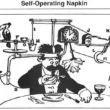The Deep Capture website was created to bypass the “captured” institutions that mediate our nation’s discourse. It was initially funded by Patrick Byrne, CEO of Overstock.com, but it is not part of Overstock. It functions as a separate, limited liability media company.
Public choice theory describes a phenomenon whereby industries take control of, or “capture”, regulators who are supposed to oversee them. The claim of this website is that powerful actors have been able to influence or take control of not just the regulators, but also law enforcement, elected officials, national media, and the intellectual establishment.
It is our mission to expose this “deep capture.”
Dr. Patrick M. Byrne
[email protected]
Patrick received a bachelor’s degree in philosophy and Asian studies from Dartmouth College, a master’s in philosophy (ethics) from Cambridge University as a Marshall Scholar, and a doctorate in philosophy (focusing on political theory, jurisprudence, and economics) from Stanford University. He has taught at the university level and frequently guest-lectures on business, the Internet, leadership and ethics.
Patrick served as chairman, president and CEO of Centricut, LLC, a manufacturer of industrial torch consumables, then held the same three positions at Fechheimer Brothers, Inc., a Berkshire Hathaway company that manufactures police, firefighter and military uniforms. Patrick Michael Byrne is the chairman and CEO of Overstock.com, Inc., a Utah-based internet retailer that has been publicly traded since 2002.
In 2001, Patrick began Worldstock.com, Overstock.com’s socially responsible store for products handcrafted by artisans from developing nations and rural areas of the USA. To date, more than $30 million has been returned to Worldstock’s artisan suppliers.
Read more about Patrick Byrne.
__________________________________________
How Deep Capture Operates
If there is one institution that the media views as beyond criticism, it is the media itself. So it is perhaps unsurprising that there are few stories about the “deep capture” of the nation’s major news organizations. More surprising is that mainstream journalists (because they are meek, constrained by their bureaucracies, or simply do not have the time) have refrained from publishing serious investigations and commentary about the “deep capture” of our nation’s other institutions.
That is where Deep Capture comes in. We take a new approach to journalism.
Here’s how we operate:
For starters, we are The Deep Capture Team. The typical media story is written on a tight deadline by a single rumpled journalist in a cubicle. The material that appears on Deep Capture comes from not only journalists, but also economists, statisticians, reformed stock brokers, former government officials, gonzo computer experts, business leaders, and a small army of freelance researchers. We are no-holds barred, and any and all concerned citizens are welcome to contribute. If you have information to provide, or time to do some digging, you are part of The Deep Capture Team.
Deep Capture flips journalistic methodology on its head and pushes limits to uncover the truth. The miscreants do not like this. One convicted felon has accused us of stalking and harassing our “critics.” In fact, we debate our critics. We stalk criminals. We stay firmly within the law, while doing all we can to stop the crimes.
Finally, we take a stand. Mainstream journalists conceal hidden agendas within “he said; she said” stories that lend a veneer of objectivity. We dispose of the phony “balance” and state unequivocally that there are serious crimes underway, there are certain abominations in this world – and we stand against them.
Deep Capture is not just media. It is a movement.
Much of Deep Capture’s investigative work is directed at Wall Street money managers who engage in illegal naked short selling, stock manipulation, and the deliberate destruction of public companies. These crimes deprive society of innovations, eliminate jobs, rob Americans of their savings, and make a hoax out of corporate governance. In 2008, illegal naked short selling contributed to the near total collapse of the American financial system.
Illegal naked shorting involves hedge funds and their brokers selling stock that they have not located, borrowed or purchased. They are selling phantom stock. Data from the Securities and Exchange Commission shows that more than two billion of these phantom shares were circulating on most days during the year leading up to the market crash in September, 2008. Many experts agree the data is incomplete, and that the real number is many times larger. Phantom stock distorts supply and wipes billions of dollars of value from our markets.
Meanwhile, unscrupulous short-sellers and affiliated investors use a variety of other tactics to drive down stock prices and destroy public companies. They hire thugs to stalk and threaten corporate executives and their families. They pay small armies of “bashers” to flood the Internet with scurrilous rumors and lies. They engage in extortion and blackmail. And they collude with crooked law firms to saddle corporations with bogus class-action lawsuits.
They also conspire to cut off companies’ access to credit. They finance dubious market indexes and credit rating agencies that spread false information about the prospects of companies and the economy. They pay shady financial research shops to publish false, negative information, disguised as “independent” analysis. And they manipulate credit default swaps and derivatives, the prices of which are considered indicators of corporate health.
For years, the government did nothing. Indeed, the Securities and Exchange Commission and other agencies came to rely on short-sellers for incriminating information about public companies. Even when it became clear that much of this information was false or misleading, and had led to dead-end investigations that drained corporate resources and destroyed market value, officials maintained relationships with short-sellers and refrained from looking into their activities. Many of these officials were enticed by the prospect of leaving government for high-paying jobs at hedge funds and affiliated law firms.
With the SEC co-opted, prime brokers and market makers lost incentive to obey the rules and instead enabled the crookery of their high-paying hedge fund clients. The stock exchanges — “self-regulatory organizations” — looked the other way in deference to the brokers who are their members. An outfit called the Depository Trust and Clearing Corporation (DTCC), which is supposed to ensure that stock is delivered, fails to do so because it is owned by the Wall Street brokerages that profit from selling stock that does not exist.
Meanwhile, the DTCC, a black box organization if there ever was one, processes securities transactions valued at $1.5 quadrillion – or 30 times the gross product of the entire planet – every year, with little or no oversight from regulators or Congress.
In the summer of 2008, the SEC finally acknowledged that illegal naked short selling was a problem. Indeed, it suggested that naked short selling had the potential to collapse the financial system, and in July 2008, it issued an “emergency order” that protected 19 of the nation’s biggest financial companies from the crime. Many wondered why the SEC couldn’t extend similar protection to the hundreds of other companies that were affected, but there was hope that the SEC had come to recognize the dangers.
In August of 2008, however, the SEC lifted its “emergency order” and hedge funds immediately launched unprecedented naked short selling attacks on Lehman Brothers, American International Group, Merrill Lynch, Washington Mutual, Fannie Mae, Freddie Mac, and many other financial institutions. Within three weeks, the naked short sellers had produced enough phantom stock – and planted enough false rumors and biased media reports – to help sink the stock prices of those big financial companies to single digits.
Their suppressed stock prices made it impossible for the companies to raise new capital, and within days Lehman Brothers had gone bankrupt; AIG had been partially nationalized; Washington Mutual had been seized by U.S. Office of Thrift Supervision; Merrill Lynch (on the verge of bankruptcy) had been purchased by Bank of America; and Fannie and Freddie had been taken over by the government. Those companies were all weak before the short sellers attacked. There are many reasons why they found themselves in such dire trouble. But abusive short selling accelerated their demise.
After the near total collapse of the financial system, the SEC closed some loopholes that had helped hedge funds engage in naked short selling without getting caught. One of these loopholes – a rule that allowed market makers to temporarily sell stock they had not yet borrowed or purchased in order to “maintain liquidity” — had been written by Bernard Madoff, who was simultaneously orchestrating the biggest criminal Ponzi scheme in history.
Madoff had considerable influence at the SEC, so the SEC allowed Madoff to author its loophole. Then the SEC named the loophole after him. It was called “the Madoff Exemption.”
Although the SEC has closed some loopholes, there are other loopholes to exploit, and naked short selling continues. Unscrupulous short-sellers also continue to use their other dirty tricks to drive down stock prices. Bank of America and Citigroup have been brutally attacked in recent months, as have countless smaller companies – entrepreneurial companies with innovative products; biotech firms with medicines that could save lives. Many of these companies are struggling for their survival.
This scandal has provoked outrage among executives and thousands of ordinary people, many of whom have deluged Congress and the SEC with letters. In response, six Senators declared that naked short selling helped collapse the financial markets, and authored a bill calling on the SEC to enforce stricter rules.
Meanwhile, other prominent officials – including former Chairmen of the SEC, the Secretary of the Treasury, the head of the U.S. Chamber of Commerce, multiple U.S. Congressmen, the CEO’s of Wall Street’s biggest banks, Barack Obama, Hillary Clinton, and John McCain – have implicated naked short selling in the recent financial turmoil.
But the halls of Congress and the SEC swarm with hedge fund lobbyists, and the government remains behind the ball. Specifically, the lobbyists have so far successfully stymied efforts to have the SEC enforce a “pre-borrow” that would require hedge funds and brokers to obtain actual shares before selling them, in each and every case. Meanwhile, the SEC has yet to prosecute a single major hedge fund for illegal naked short selling.
Most disturbing of all, perhaps, is the fact that the mainstream media has utterly failed to cover what is surely the biggest financial scandal of our era. Not only have journalists failed to cover naked short selling crimes, but many have come to rely on miscreant hedge funds as sources of “dirt” for negative stories (many of them false or biased) about public companies that the hedge funds are attacking. Perhaps these relationships explain why journalists have hesitated to write critically about short sellers. Perhaps other incentives have entered into their calculations.
Deep Capture has identified one clique of influential reporters – some merely dishonest, some giving all appearances of outright corruption, all with unusually close ties to one particular group of short-selling hedge fund managers. For years, these reporters churned out “hatchet jobs” that benefited the hedge funds financially, while going to great lengths to whitewash the crime of naked short-selling. When evidence of the crime began to appear on the Internet, hedge funds and some of these journalists hijacked social media, clogging message boards and even obtaining special editing privileges on Wikipedia, to distort the public discourse.
Many of those journalists have since faded from the scene. As the crime and the cover-up was exposed, some of them sought to distance themselves from short sellers. One day after “The Story of Deep Capture” exposed CNBC’s Jim Cramer as being a central figure in the cover-up, Cramer announced that naked short selling was a big problem. Soon after, he began calling some short sellers “diabolical,” and announced that he was on a “crusade” to stop illegal naked short selling from destroying America. Other reporters in Cramer’s circle have since left journalism and gone to work for the short sellers.
Outside of this clique, most mainstream journalists are honest. There are segments of the mainstream media that do not rely on short sellers as their only sources of information. But for whatever reasons, even the uncompromised journalists have shied away from reporting on one of the most important issues affecting our economy.
We hope that Deep Capture and its extended team can help fill this void.
We thank you for your interest and support.



